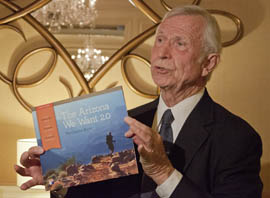Cronkite News has moved to a new home at cronkitenews.azpbs.org. Use this site to search archives from 2011 to May 2015. You can search the new site for current stories.
Center outlines steps for achieving ‘The Arizona We Want’
PHOENIX – Create 75,000 jobs that increase average wages by 30 percent. Deliver high-speed broadband Internet throughout the state. Thin 30,000 additional acres of land annually to prevent forest fires. Increase health care coverage and fund the Common Core Standards.
These are just some of the goals in The Arizona We Want 2.0: The Case for Action, a report released Thursday by the Center for the Future of Arizona.
Lattie F. Coor, the center’s chairman and CEO, described the report as a call to action for all Arizonans. It focuses on eight broad areas including education, health care and civic engagement and offers goals with measurable benchmarks in each category.
“There is now a menu from which action can be taken,” Coor said.
The Arizona We Want 2.0 comes three years after The Arizona We Want, a citizens agenda the center produced based on the results of the 2009 Gallup Arizona Poll.
The center created the 2.0 report by examining how far the state has come in meeting the goals of the initial report and how changes will affect the future. The Arizona We Want 2.0 also includes results of the 2012 Civic Health Index, which measures how well citizens connect to each other and their communities.
“This is not a report that will sit on a shelf,” said Donald Smith, president and CEO of SCF Arizona and member of The Arizona We Want Institute Board of Advisors. “This report is a continuous roadmap … for action. The success of this report relies on collective action from all of us.”
Many of the top priorities the report identifies deal with the needs of young people and of the state’s growing minority population. According to the report, Arizona will be one of the first states to have a minority population become the majority.
It also cited a need to retain young talent in the state and better prepare students for the 21st century workforce, including by funding and implementing the Common Core Standards. Coor said although the state offers many entry-level jobs, there may not be room for career advancement.
Courtney Klein Johnson, founder of New Global Citizens and another member of the institute’s Board of Advisors, said creating a unique sense of place is a way to draw young people to the state. She said embracing the state’s rich history would help establish Arizona as a place where graduates will want to stay.
“Often you have people talking about going to Boston or San Francisco or Austin. Why? Because there’s something intrinsically unique about each of those places,” she said.
The report also calls for rebuilding and expanding on the opportunities for research, investment and innovation.
Goals outlined in the report include 100 percent increases in venture capital and private investments annually and moving the state into the nation’s top 10 for research and development.
“I believe there is a spirit – almost an entrepreneurial spirit – in Arizona that is better than anywhere else in the country,” Coor said.







